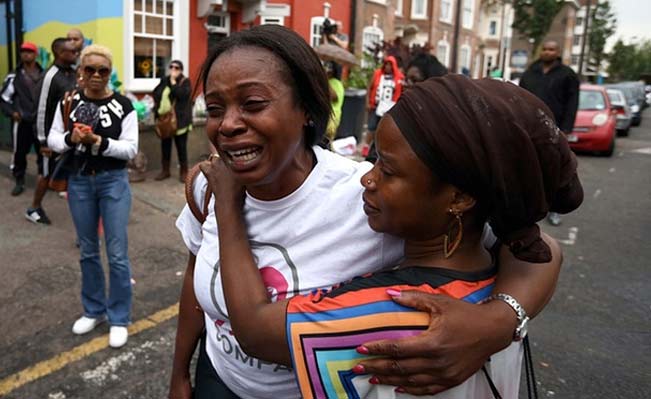 A woman is comforted as she breaks down in tears outside a Kids Company premises in Camberwell, London, after the announcement of its closure. Photograph: Carl Court/Getty Images
A woman is comforted as she breaks down in tears outside a Kids Company premises in Camberwell, London, after the announcement of its closure. Photograph: Carl Court/Getty Images
The sudden and controversial closure of Kids Company – in London, Bristol and Liverpool – has generated widespread concern and debate. Ibn Yayha offers his perspective
It would take a great deal of effort to either avoid coming across the name ‘Camilla Batmanghelidj’ in a newspaper, or not see her equally flamboyant shimmer of robes and head dresses on TV in recent years. Yet, being thirty-odd and childless, it’s to my shame I haven’t bothered to look at her former charity, the Kids Company, until relatively recently.
It was reportedly one of the most important charities of its kind, enjoying significant government funding and patronage, while providing a life-line for children who often were – and are now more than ever – the victims of Tory-authored austerity and its attendant social ills.
That the government was pumping money into a children’s charity while, via its own policies, was stripping children of the right to a secure childhood is so evidently a contradiction that the writing must have been on the wall long before the tragic events of this week. ‘You’ve done your PR job for us, now jog on’, they must have said to themselves.
Some serious allegations have been levelled at the charity which we’ve been told has sullied its reputation. But if a packed street of frustrated children and their parents outside the charity’s South London premises is anything to go by, there appears to be a great deal of support for it.
In fact, this was no protest against the company’s closure as one report claimed. People were jumping up and down in anger because they weren’t sure whether they would, by winter, have food to eat, let alone a house to eat in. As one child, no older than twelve said: ‘If it wasn’t for the Kids Company, we’d be living in a cardboard box.’
The Channel 4 News and BBC News reports which showed these desperate scenes were also revealing in that nearly everyone there was black while almost every parent spoke English with a strong foreign accent. This should serve as a reminder that there is an important racial element to Tory austerity and housing policy.
Any initiative to combat austerity must include such communities, often rendered invisible by the pen stroke of city planners. Their own sordid history of oppression that stretches back generations, as well as a determined history of resistance which goes back as far, must also be understood.
Others yet may not have the courage to pour onto the streets to demand their rights. But If yesterday’s events are anything to go by, they may soon have no choice.

